sentences difficult to translate
主动形式表被动的几种情况

主动形式表被动的几种情况在英语教学中,有一些单词形式上是主动形式,实际上却是表达被动的意思。
而在实际的教学中,常见的有以下单词:一、某些表示状态特征的系动词:如:sound,seem,smell,taste, look, feel, 有时用主动形式表被动意义.The music sounds wonderful. 这首音乐听起来很优美。
The flowers smell sweet。
这些花闻起来很香甜。
The apples taste delicious。
这些苹果尝起来非常美味可口。
二、某些表主语内在品质或性能的动词:如:lock,sell, wash,read,write,open, wear, keep 其主动形式表被动意义。
The door won't lock. 门没有锁上。
These books sell well. 这些书很畅销。
Does the cloth washes well?这种布经洗吗?三、作表语用的一些形容词:如:easy,difficult, hard,nice, possible, impossible 等后面作状语的不定式,其主动形式表被动意义。
I think English is easy to learn。
我认为英语很容易学。
The physics problem is not difficult to work out。
这些物理问题不好解决.四、不定式作定语,又与所修饰的名词或代词存在逻辑上的动宾关系,此时的主动形式表被动的意义。
I have a lot of work to do today. 今天我有很多事情要做.He has some questions to ask。
他有一些问题要问.Would you like something to drink? 你要点东西喝吗?五、“too。
.。
to”结构中的不定式的主动形式表被动的意义.The box is too heavy to carry。
高中英语人教版必修四单元教案:Unit4BodyLanguage
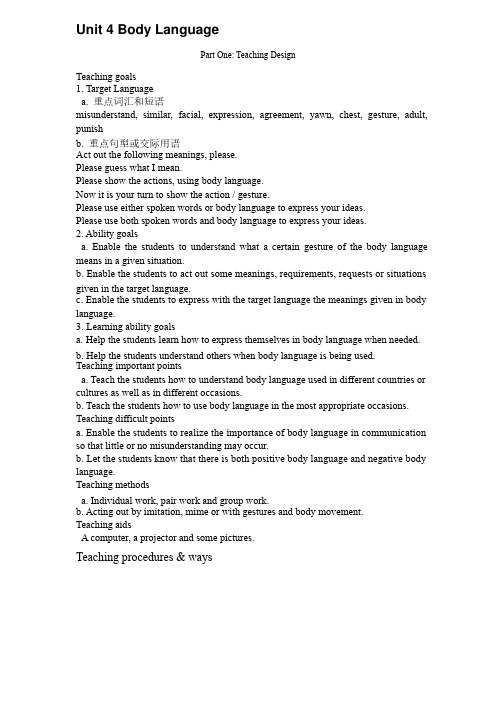
Unit 4 Body LanguagePart One: Teaching DesignTeaching goals1. Target Languagea. 重点词汇和短语重点词汇和短语misunderstand, similar, facial, expression, agreement, yawn, chest, gesture, adult, punishb. 重点句型或交际用语重点句型或交际用语Act out the following meanings, please.Please guess what I mean.Please show the actions, using body language.Now it is your turn to show the action / gesture.Please use either spoken words or body language to express your ideas.Please use both spoken words and body language to express your ideas.2. Ability goalsa. Enable the students to understand what a certain gesture of the body language means in a given situation.b. Enable the students to act out some meanings, requirements, requests or situations given in the target language.c. Enable the students to express with the target language the meanings given in body language.3. Learning ability goalsa. Help the students learn how to express themselves in body language when needed.b. Help the students understand others when body language is being used.Teaching important pointsa. Teach the students how to understand body language used in different countries or cultures as well as in different occasions.b. Teach the students how to use body language in the most appropriate occasions. Teaching difficult pointsa. Enable the students to realize the importance of body language in communication so that little or no misunderstanding may occur.b. Let the students know that there is both positive body language and negative body language.Teaching methodsa. Individual work, pair work and group work.b. Acting out by imitation, mime or with gestures and body movement.Teaching aidsA computer, a projector and some pictures.Teaching procedures & waysThe first period reading(COMMUNICATION: NO PROBLEM?)AimsTo help students develop their reading ability.To help students learn about body language.ProceduresI. Warming upWarming up by actingLook at the list of interpretation on the right side of the chart. Perform the action or the nonverbal behaviour on the left side.Examples Of Body LanguageWarming up by defining—What is body language?II. Pre-reading1. Looking and sayingLook at the man in the picture below. What does he say to you by his body language?Basically, how the ...... do I know? Or, I don’t know nothin! The shoulders are hunched and the hands are open signifying a big question mark.2. Talking and sharingBody language is the quiet, secret and most powerful language of all!According to experts, our non-verbal language communicates about 50% of what we really mean (voice tonality contributes 38%) while words themselves contribute a mere 7%.Our bodies send out messages constantly and often we don't recognize that we're communicating a lot more than we realize.Our understanding and use of non-verbal cues in facial expression are familiar to us nearly from birthIII. Reading1. Reading aloud to the recordingNow please listen and read aloud to the recording of the text COMMUNICATION: NO PROBLEM?. Pay attention to the pronunciation of each word and the pauses within each sentence. I will play the tape twice and you shall read aloud twice, too.2. Reading and underliningNext you are to read and underline all the useful expressions or collocations in the passage. Copy them to your notebook after class as homework.3. Reading to identify the topic sentence of each paragraphNext you are to skim the text to identify the topic sentence of each paragraph.4. Reading and transferring informationRead the text again to complete the table. Where is he/ she from? What does he/ she do when he/ she meet someone at the airport for the first time?Name Country Action MeaningMr GarciaJulia SmithAhmed AzizMadame Coulon5. Reading and understanding difficult sentencesAs you have read the text times, you can surely tell which sentences are difficult to understand. Now put your questions concerning the difficult points to me the teacher.6. Reading and translatingNow it’s time to translate the text into Chinese, sentence by sentence. Who will be the first to d o it?IV. Closing downClosing down by doing exercisesTo end the lesson you are to do the comprehending exercises No. 1 and 2 on page 26 and 27.Closing down by checkingC heck some of the following basic non-verbal cues and you'll recognize that you already speak and translate much of the language.“I’m surprised!” I’m shocked!” “I’m sad!”The second period Learning about Language(The ~ing form as the Attribute & Adverbial)I. Warming upWarming up by discovering useful words and expressionsTurn to page 27 and do exercises No. 1, 2 ,3 and 4 first. Check your answers against your classmates’.II. Learning about grammar1. Reading and thinkingTurn to page 25 and read with me the text of COMMUNICATION: NO PROBLEM? As you read along, pay attention to the uses of The ~ing form as the Attribute & Adverbial. (They are visitors coming from several countries. 作定语;Four people enter looking around in a curious way. 作状语;作状语; This is an exciting experience for you. 作定语; You stand watching and listening. 作状语;……)2. Doing exercises No. 1 and 2 on page 29Turn to page 29. Do exercises No. 1 and 2。
m1 Unit3
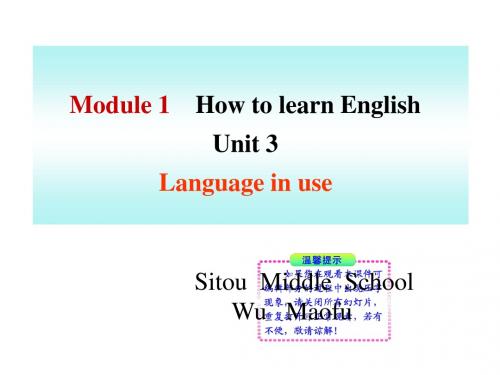
Choose the best answers.
1. — _____ good advice he gave us! — Yes. He always has so many wonderful ideas. A. What B. What a C. How D. How a
2. My pen friend, Jack, often helps me _____my English. A. on B. in C. with D. about
根据所给汉语完成下列英语句子,每空一词。 根据所给汉语完成下列英语句子 每空一词。 每空一词
1. 他和他父亲一直住在北京。 他和他父亲一直住在北京。 He lived in Beijing with his father ____ ____ _____. all the time 2. 托尼喜欢看英文电影,听英文广播。 托尼喜欢看英文电影,听英文广播。 enjoys watching Tony ______ ________ English films and ________ ___ listening to the radio in English.
10. She tried ______, but she found it difficult. A. not to worrying C. not to worry B. to not worry D. to worry not
11. — What’s your plan for the coming weekend? — ______ go to fly kites? A. Why not to C. Why don’t we B. Why don’t D. How about
B) 用括号中所给单词的适当形式填空。 用括号中所给单词的适当形式填空。
八年级英语上Module1-2练习题
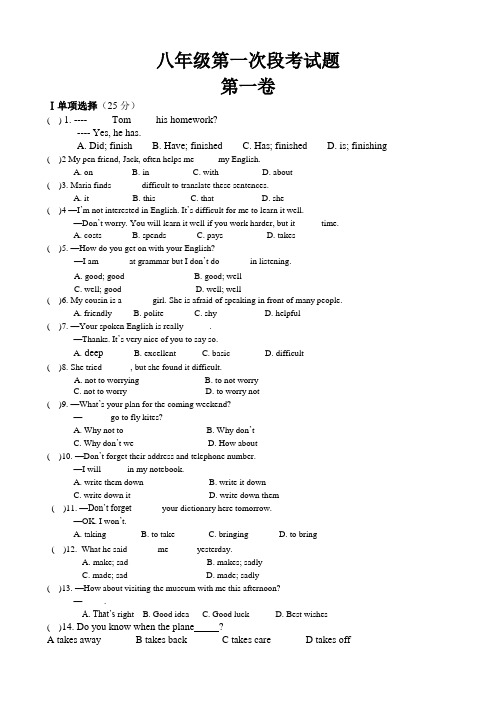
八年级第一次段考试题第一卷Ⅰ单项选择(25分)( ) 1. ---- ____ Tom ____ his homework?---- Yes, he has.A. Did; finishB. Have; finishedC. Has; finishedD. is; finishing ( )2 My pen friend, Jack, often helps me _____my English.A. onB. inC. withD. about( )3. Maria finds ______ difficult to translate these sentences.A. itB. thisC. thatD. she( )4 —I’m not interested in English. It’s difficult for me to learn it well.—Don’t worry. You will learn it well if you work harder, but it _____ time.A. costsB. spendsC. paysD. takes( )5. —How do you get on with your English?—I am ______ at grammar but I don’t do ______ in listening.A. good; goodB. good; wellC. well; goodD. well; well( )6. My cousin is a ______ girl. She is afraid of speaking in front of many people.A. friendlyB. politeC. shyD. helpful( )7. —Your spoken English is really______.—Thanks. It’s very nice of you to say so.A. deepB. excellentC. basicD. difficult( )8. She tried ______, but she found it difficult.A. not to worryingB. to not worryC. not to worryD. to worry not( )9. —What’s your plan for the coming weekend?—______ go to fly kites?A. Why not toB. Why don’tC. Why don’t weD. How about( )10. —Don’t forget their address and telephone number.—I will _____ in my notebook.A. write them downB. write it downC. write down itD. write down them( )11. —Don’t forget ______ your dictionary here tomorrow.—OK. I won’t.A. takingB. to takeC. bringingD. to bring( )12.What he said ______ me ______yesterday.A. make; sadB. makes; sadlyC. made; sadD. made; sadly( )13. —How about visiting the museum with me this afternoon?—_____.A. That’s rightB. Good ideaC. Good luckD. Best wishes( )14. Do you know when the plane ?A takes awayB takes backC takes careD takes off( )15. This song sounds .A nicelyB wonderfullyC beautifulD beautifully( )16. ---What are you going to do this weekend?--- I yet.A didn’t decidedB haven’t decidedC won’t decideD have decided( )17. --- you ever a car?---No, never.A Have, driveB Have, drivenC Do, driveD Did, driven( )18. Has she visited China ?A agoB beforeC asD since( )19. I think the price of the watch is very and I don’t have enough money.A lowB highC expensiveD cheap( )20. Linda her breakfast. She isn’t hungry now.A is eatingB ateC will eatD has eaten( )21. ---Have you finished your homework yet?--- . But I’ll finish it soon.A Yes, I haveB No, neverC CertainlyD No, I haven’t( )22 Have you your homework?A finish doingB finished to doC finish doD finished doingⅡ.完形填空(10分)Many students have a problem called test anxiety(考试焦虑症) . What will you do?Don’t 26 . When you know you have the problem, you are 27 to solve(解决) it. This problem isn’t all 28 . In some ways, it can help you. You sometimes think and do things more quickly if you are under stress(压力).29 , too many worries are bad for you. Sometimes, it 30 make you feel ill.When you are having exams and worrying about something, 31 what you’re doing and close your eyes. Tell yourself, “I can!” Then think of being at a 32 place and let your body relax. When you go 33 to the test, find questions you know the answers to and answer them 34 . This will make you feel better.The most important is to start preparation(准备) early. You can study for it three or five days 35 the test or exam. This will help you do better.( )26. A. worry B. afraid C. laugh D. frighten( )27. A. finishing B. beginning C. leaving D. making( )28. A. good B. nice C. bad D. weak( )29. A. Because B. So C. If so D. However( )30. A. must B. can C. needn’t D. has to( )31. A. write B. find C. stop D. read( )32. A. comfortable B. cold C. difficult D. strange( )33 A. away B. up C. down D. back( )34. A. last B. easily C. slowly D. first( )35. A. before B. after C. until D. atⅢ.阅读理解(20分)AOne evening I visited the English corner of our town. It is near our school. There are many trees, flowers anda nice ground there. Every evening, large numbers of people go there to practise their English, but I never went there before.When I arrived, many people were already(已经) there. I looked around and found that most of them were students. Some of them talked in English in twos and threes. To my surprise, I found three foreigners talking and smiling with some students who listened with great interest. Just then, a tall student came to me and asked, “Shall we have a talk in English?” My heart beat very fast at that moment because it was the first time for me to visit the English corner. Anyway, I said “Yes”. Soon we talked freely about our studies, lives, hobbies as well as our problems of learning English. Time went fast, and it was already 11 o’clock before I realized it. I enjoyed myself there and was glad to learn a lot at the English corner. I und erstood the famous saying “Practice makes perfect.” ( )36. Why large numbers of people go to the English corner?A. Because they would like to visit that nice ground there.B. Because they would like to improve their English.C. Because they would like to make friends with foreigners.D. Because they would like to have a talk in Chinese with others.( )37. Most of people were _____ in the English corner.A. workersB. teachersC. foreignersD. school students( ) 38. The writer talked with a student about their _____ in English.A. homework, lives, hobbies as well as problems of learning mathsB. friends, lives, hobbies as well as problems of learning ChineseC. teachers, lives, hobbies as well as problems of learning EnglishD. studies, lives, hobbies as well as problems of learning English( )39. What’s the meaning of “Practice makes perfect.”?A. 实践出真知B. 身体力行C. 熟能生巧D. 完美无缺( 40. Which of the statements is NOT true according to the passage?A. Three foreigners talked with some students.B. A tall foreigner came to the writer and talked with him in English.C. The writer went to the English corner for the first time.D. The writer had a good time in the English corner.BA dictionary is very important for the learners of English. A good English learner should know how to use a dictionary.First find a good dictionary. We usually use two kinds of dictionaries—one is English-Chinese dictionaries, and the other is Chinese-English dictionaries. Since you do not know much English yet, you should choose an English-Chinese dictionary which not only gives you the meaning of the English words in Chinese but also gives you some explanations.When you see a new word, do not use the dictionary immediately (立刻). Try to guess what it means before you look it up in the dictionary. If you cannot, then look up the word in the dictionary. Words in dictionaries are alphabetically (照字母次序) arranged (排列).The dictionary usually tells you—(1) the spelling of the word; (2) the pronunciation of the word; (3) the different meanings of the word; (4) the different ways in which the word is used in sentences. All the information is useful.( )41. A dictionary is very important for a student to learn _______.A. chemistryB. EnglishC. mathsD. physics( )42. The passage tells us that a student who does not know much English should choose ________.A. a Chinese-English dictionaryB. a good English teacherC. an English-Chinese dictionaryD. a thick English book ( )43. If we find a new word when we read, we _______.A. should ask classmates at onceB. should ask the English teacher at onceC. should not use the dictionary at onceD. should use the dictionary at once( )44. If we cannot guess what a new word means, _______.A. we may look up the word in a dictionaryB. we should give up readingC. we should stop reading at onceD. we should write it down on a piece of paper( )45. Which of the following is NOT mentioned according to the passage?A. A dictionary usually tells us how to use a dictionary.B. A dictionary usually tells us the different meanings of the word.C. A dictionary usually tells us the pronunciation of the word.D. A dictionary usually tells us the spelling of the word.Ⅳ. 任务型阅读(10分)In the school, I’m a clever girl. I can speak English very well. My classmates always ask me how to learn English. OK. Let me tell you. Speaking, listening and writing are very important.If you want to speak English very well, you should read fast and loudly. If you do this for about three months, you can speak English like a foreigner.If you want to be good at English, you can’t ignore(忽视) listening. When you talk with others, you should listen to them carefully. If you don’t pay attention to the dialogue, you will miss out a lot of things.Writing is also very important. When you learn a new word, you’d better make a sentence or more. It can expand(扩大) your vocabulary.You see, English is not very difficult. If you are interested in English and work hard, you will find it easy.根据短文内容完成下面的表格。
新技能英语-高级教程教案 unit7
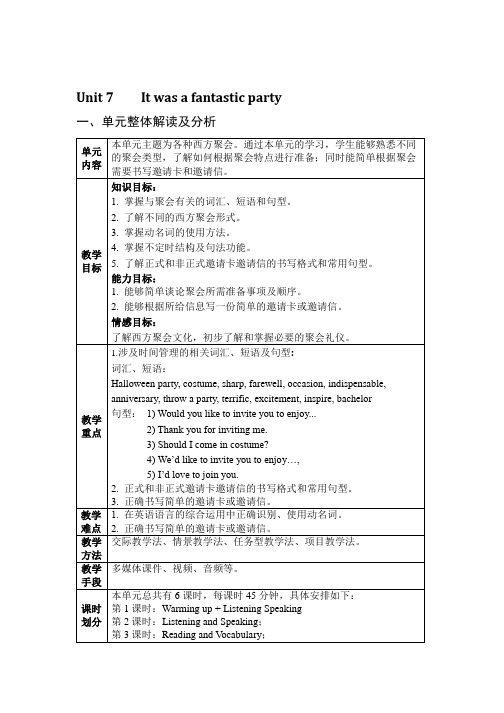
Unit 7 It was a fantastic party 一、单元整体解读及分析二、分课时教学设计Supplementary materials1. Word attack1)costume n.the set of clothes worn while people are performing. 戏装服装,装束;戏装,剧装e.g.The performers, in costume and makeup, were walking up and downbackstage.上了妆穿着戏服的演员在后台走来走去。
2)sharp adv. exactly at the stated time 整点e.g.The party will start at 7:00 pm sharp. 聚会于晚上七点整开始。
3) by the way adv. introducing a different topic 顺便一提e.g. By the way, have you done anything behind my back? 顺便问一下,你背着我干了什么?2. Useful expressionsTalk about the way of inviting1) Would you like to invite you to enjoy...2) Thank you for inviting me.3) Should I come in costume?4) We’d like to invite you to enjoy…,5) I’d love to join you.1. Introduction of HalloweenHalloween is an annual holiday observed on October 31, which commonly includes activities such as trick-or-treating, attending costume parties, carving jack-o'-lanterns, bonfires, apple bobbing, visiting haunted attractions, playing pranks, telling scary stories, and watching horror films.Historian Nicholas Rogers, exploring the origins of Halloween, notes that while "some folklorists have detected its origins in the Roman feast of Pomona, the goddess of fruits and seeds, or in the festival of the dead called Parentalia, it is more typically linked to the Celtic festival of Samhain". The name is derived from Old Irish and means roughly "summer's end". Snap-Apple Night (1832) by Daniel Maclise depicts apple bobbing and divination games at a Halloween party in Blarney, Ireland. The name 'Halloween' and many of its present-day traditions derive from the Old English era.The word Halloween is first attested in the 16th century and represents a Scottish variant of the fuller All-Hallows-Even ("evening"), that is, the night before All Hallows Day. Although the phrase All Hallows is found in Old English, All-Hallows-Even is itself not attested until 1556.2. Word attack1)fall asleep v. change from a waking to a sleeping state入睡;睡着e.g. After changing the bed, I would fall asleep quickly. 换了一张床,我很快就能睡着了。
英语论文-浅谈英语长句的汉语翻译

浅谈英语长句的汉语翻译[Abstract] The aim of this essay is to tell us how to translate English long sentences into Chinese correctly and precisely. It contains the comparison between English and Chinese long sentences, and defines English long sentence. The common types of English long sentences are classified in the essay, and it also explains why and where long English sentences are used respectively. In the third part of the essay, we proposes the steps and methods in translating long English sentence. In conclusion part, we points out the key to become a good translator is to read and practice as much as possible, and also mentions the similar ways in translating Chinese long sentences to English. [Key Words] long sentences; understanding; expressing; translating【摘要】本论文主要是向大家介绍如何准确到位的将英语长句翻译为中文。
作者比较了中英文句子结构和表达的不同特点,同时对英语长句作了定义,对常见的几种英文长句作了说明,并且分别介绍了英语长句发生的原因和背景。
新思路大学英语基础教程第一册(第二版)教案unit4

For example:part-time jobs, volunteer work, sports, student club activities, reading,etc.
2)In the first question, if your answer is “YES”, could you please share your experience andwhat have you got from your extracurricularactivities?
5 mins
Conversation
1.Pre-listening
Step 1
Introduce the background information aboutNational Fitness dayby showing the pictures.
Step 2
Pronounce the new vocabulary and key sentences for the class to repeat and explain some of difficulties.
Step4Teacherasks students to read the new words in the conversation according to thephonetic symbolslearned above.
14 mins
Homework
1) Studentsfurther explore their after-class activities and share it with their partner.
5 mins
英汉翻译学习Lesson3
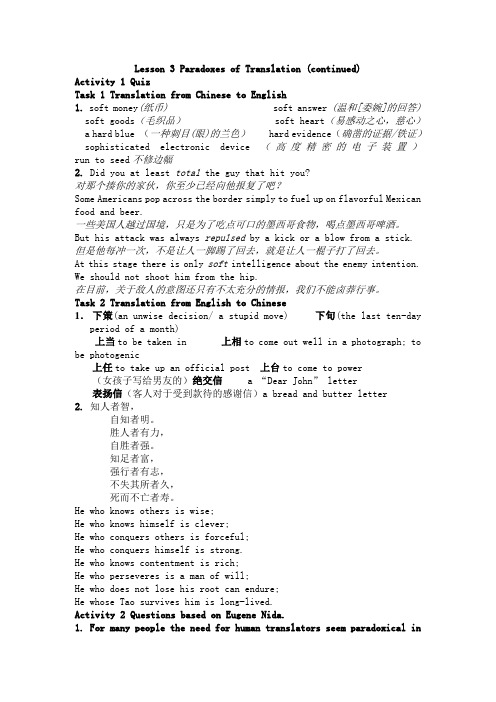
Lesson 3 Paradoxes of Translation (continued)Activity 1 QuizTask 1 Translation from Chinese to English1. soft money(纸币) soft answer (温和[委婉]的回答) soft goods(毛织品) soft heart(易感动之心,慈心)a hard blue (一种刺目(眼)的兰色) hard evidence(确凿的证据/铁证)sophisticated electronic device (高度精密的电子装置)run to seed不修边幅2. Did you at least total the guy that hit you?对那个揍你的家伙,你至少已经向他报复了吧?Some Americans pop across the border simply to fuel up on flavorful Mexican food and beer.一些美国人越过国境,只是为了吃点可口的墨西哥食物,喝点墨西哥啤酒。
But his attack was always repulsed by a kick or a blow from a stick. 但是他每冲一次,不是让人一脚踢了回去,就是让人一棍子打了回去。
At this stage there is only soft intelligence about the enemy intention. We should not shoot him from the hip.在目前,关于敌人的意图还只有不太充分的情报,我们不能卤莽行事。
Task 2 Translation from English to Chinese1.下策(an unwise decision/ a stupid move) 下旬(the last ten-day period of a month)上当to be taken in 上相to come out well in a photograph; to be photogenic上任to take up an official post 上台to come to power(女孩子写给男友的)绝交信 a “Dear John” letter表扬信(客人对于受到款待的感谢信)a bread and butter letter2. 知人者智,自知者明。
基英翻译答案
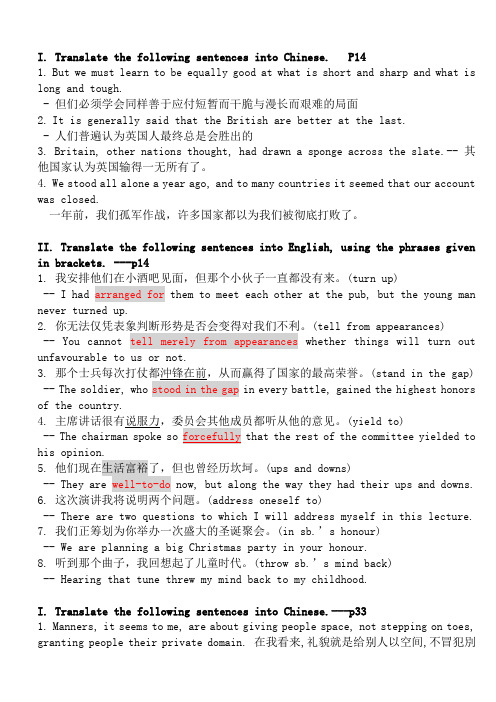
I. Translate the following sentences into Chinese. P141.But we must learn to be equally good at what is short and sharp and what is long and tough.- 但们必须学会同样善于应付短暂而干脆与漫长而艰难的局面2.It is generally said that the British are better at the last.- 人们普遍认为英国人最终总是会胜出的3. Britain, other nations thought, had drawn a sponge across the slate.-- 其他国家认为英国输得一无所有了。
4. We stood all alone a year ago, and to many countries it seemed that our account was closed.一年前,我们孤军作战,许多国家都以为我们被彻底打败了。
II. Translate the following sentences into English, using the phrases given in brackets. ---p141. 我安排他们在小酒吧见面,但那个小伙子一直都没有来。
(turn up)-- I had arranged for them to meet each other at the pub, but the young man never turned up.2. 你无法仅凭表象判断形势是否会变得对我们不利。
(tell from appearances)-- You cannot tell merely from appearances whether things will turn out unfavourable to us or not.3. (stand in the gap)-- The soldier, in every battle, gained the highest honors of the country.4. 主席讲话很有说服力,委员会其他成员都听从他的意见。
跨境电商英语综合测试卷及答案

《跨境电商英语》期末试卷(D)Part 1. Useful Expressions (共15小题,每小题1 分, 合计15 分) Directions: The following is a list of terms related to Cross-border E-commerce. After reading it, you are required to find the items equivalent to those given in Chinese in the table below.A--transaction volume I-- keywordB--store description J-- brand styleC--market campaign K-- logisticsD--data analysis L--attribute wordE-- expected profit M--flow wordsF-- corporate culture N-- social mediaG--page view O-- target customerPart 2. Translation(共6小题,16-20题每小题3分,21题10分, 合计25分)Directions: This part, numbered 11 to 16, is to test your ability to translate Chinese into English of the five sentences. No.16 is to test your translation ability of paragraph from English into Chinese.16.收到您订单后48小时内发货。
____________________________________________________________ 17.只要是我方责任,我们一定承担您的损失。
江苏译林五年级上第八单元学案
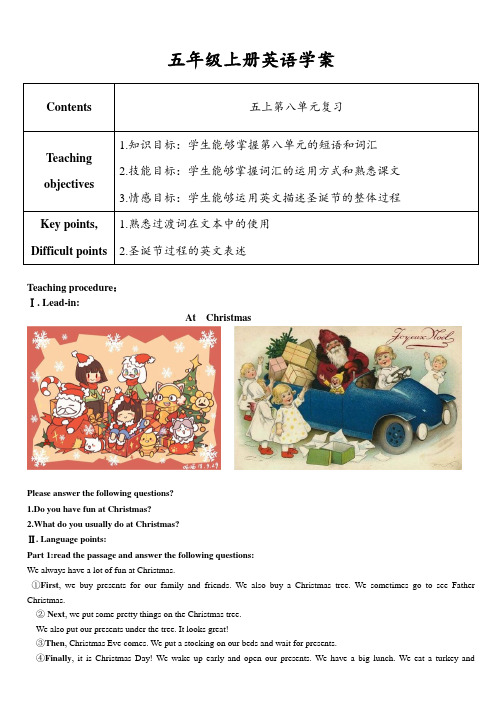
五年级上册英语学案Contents 五上第八单元复习Teaching objectives 1.知识目标:学生能够掌握第八单元的短语和词汇2.技能目标:学生能够掌握词汇的运用方式和熟悉课文3.情感目标:学生能够运用英文描述圣诞节的整体过程Key points, Difficult points 1.熟悉过渡词在文本中的使用2.圣诞节过程的英文表述Teaching procedure:Ⅰ. Lead-in:At ChristmasPlease answer the following questions?1.Do you have fun at Christmas?2.What do you usually do at Christmas?Ⅱ. Language points:Part 1:read the passage and answer the following questions:We always have a lot of fun at Christmas.①First, we buy presents for our family and friends. We also buy a Christmas tree. We sometimes go to see Father Christmas.②Next, we put some pretty things on the Christmas tree.We also put our presents under the tree. It looks great!③Then, Christmas Eve comes. We put a stocking on our beds and wait for presents.④Finally, it is Christmas Day! We wake up early and open our presents. We have a big lunch. We eat a turkey andChristmas pudding. We all have a good time.Q:1.Why do you love Christmas?____________________________________________________________________Q:2.How do we decorate(装饰) the Christmas tree?____________________________________________________________________答案:1.Because we can have fun at Christmas./ Because we can do many interesting things at Christmas.2.We can put our presents under the tree and we also put our presents under the tree.Part2:words and phrases(try to fill in the blanks according to the passage above.)1.买___________2.接着,然后___________3.放___________4.看起来___________5.早早地___________6.歌曲___________10.在......以后___________ 11.第一,首先___________ 12.那时,然后___________2.三会单词:1.圣诞节___________2.礼物___________3.漂亮的___________4.物品,东西___________5.长筒袜___________6.卡片___________7.火鸡,火鸡肉___________ 8.布丁___________ 9.全都___________10.信息,消息___________ 11.孩子们___________ 12.折叠,合拢___________3.四会词组:________________________________________________3.玩得开心________________________________________________5.买一颗圣诞树________________________6.去看圣诞老人________________________7.在圣诞树上________________________________________________9.在圣诞树下____________________________________________________________________________________________________________________________________________________________________________________________________________________________________________________________________________________________________________________________________________________________________________________________3.吃一个火鸡________________________________________________________________________________________________________________________________________________________________________________________________________________________________________________Part3:sentences.(try to translate the following Chinese into English and speak aloud.)四会句型:1.我们通常在圣诞节这天干些什么?_______________________________________2.首先,我们为朋友和家人买礼物。
How to translate
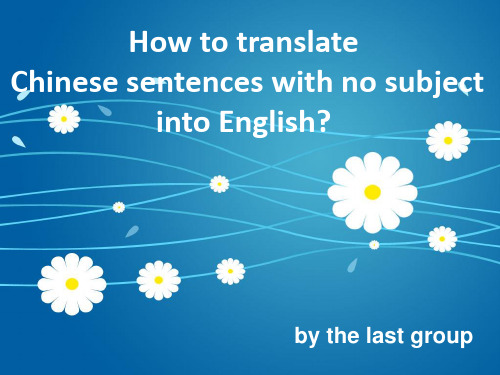
4.Translating the philosophical sentences by “there be”
一直角等于九十度。(引申) There is 90 degrees in a 怕没柴烧 Where there is life, there is hope.
2、表示demanding,provision等
• 必须尊敬长辈。 • The elders should be respected. • 发现了错误,一定要改。 • Wrongs must be righted when they were discovered.
Inverted Word Order (倒装语序)
2.When there is place of adverbial words in a sentence, we can also translate “there be” into “某处有”. 世界上没有处于绝对静止状态的任何物体。 There is not anybody in an absolute state of rest in the world. 天空中有成千上万像太阳一样的星星。 There are many thousands of stars in the sky that are like the sun. 房子里有桌子和椅子吗? Were there any desks and chairs in the room?
保持肃静! Keep quiet.
• 请勿吸烟 No smoking.
请勿吸烟No smoking. 别傻了 Don't be silly.
• 别傻了。 Don't be silly.
• 实话实说。 Call a spade a spade.
英语的主题结构分类及其翻译_主题句
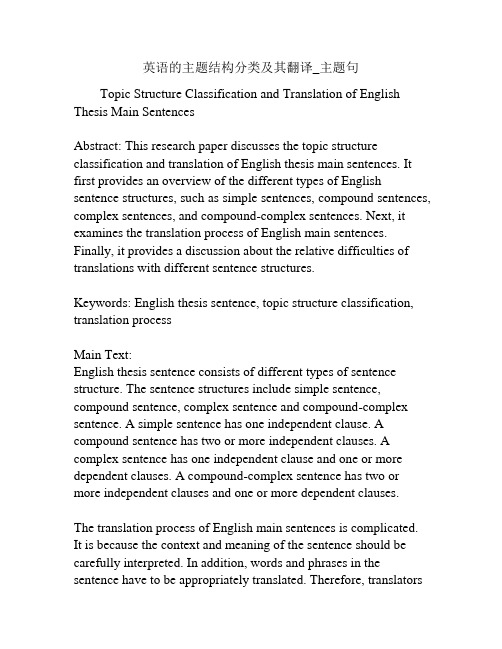
英语的主题结构分类及其翻译_主题句Topic Structure Classification and Translation of English Thesis Main SentencesAbstract: This research paper discusses the topic structure classification and translation of English thesis main sentences. It first provides an overview of the different types of English sentence structures, such as simple sentences, compound sentences, complex sentences, and compound-complex sentences. Next, it examines the translation process of English main sentences. Finally, it provides a discussion about the relative difficulties of translations with different sentence structures.Keywords: English thesis sentence, topic structure classification, translation processMain Text:English thesis sentence consists of different types of sentence structure. The sentence structures include simple sentence, compound sentence, complex sentence and compound-complex sentence. A simple sentence has one independent clause. A compound sentence has two or more independent clauses. A complex sentence has one independent clause and one or more dependent clauses. A compound-complex sentence has two or more independent clauses and one or more dependent clauses.The translation process of English main sentences is complicated. It is because the context and meaning of the sentence should be carefully interpreted. In addition, words and phrases in the sentence have to be appropriately translated. Therefore, translatorshave to have a deep understanding of the source language and the target language.Different types of English sentence structures have their own complexities in translation. Simple sentences are usually easy to understand and therefore can be easily translated. However, compound sentences are harder since they contain multiple clauses that need to be carefully identified and translated. Complex sentences are even more difficult as they contain both independent and dependent clauses, meaning that all components of the sentence need to be accurately rendered in the target language. Compound-complex sentences are even more difficult as they require a great attention to detail in order to convey the same meaning, nuance, and tone as the original.In conclusion, English thesis main sentences require a thorough understanding of the language and the context of the sentence in order to be effectively translated. The difficulty of the translation process will vary depending on the type of sentence structure used. Simple sentences are usually the easiest to translate while compound-complex sentences are the most difficult. translators.English thesis sentences can be used in a variety of applications. For example, they can be used to effectively convey ideas in academic writing, such as in research papers, essays and dissertations. They can also be used to express complex concepts in business documents, such as in contracts, legal documents and marketing material. In addition, English thesis sentences are often used in communication, both formal and informal. This includes letters, emails, presentations and conversations.Overall, the use of English thesis sentences depends on the application and the audience. For example, if the goal is to communicate a complex concept with clarity to an educated audience, then suitably constructed thesis sentences should be used. However, if the goal is to communicate with simplicity to a less informed audience, then simpler sentence constructions should be used. No matter what the goal is, having an understanding of the proper sentence structure can help ensure effective communication.Besides the applications mentioned above, English thesis sentences are also used in creative writing. Authors of novels and short stories use thesis sentences to convey key themes and ideas, create suspense and build tension. Moreover, thesis sentences can be used as an effective tool for poetic expression, with authors using them to craft powerful imagery and convey abstract concepts.In addition, English thesis sentences can be used to analyze data and draw conclusions. For example, in data-driven analytics, professionals use thesis sentences to construct meaningful statements based on the analysis of datasets. Similarly, newspaper articles often contain thesis sentences that summarize the main points of the article and offer a thought-provoking conclusion.In conclusion, English thesis sentences have a variety of uses and applications. They can be used to effectively communicate ideas, analyze data and draw conclusions, and to create powerful imagery and emotion. No matter what the application, understanding the different types of sentence structures can help ensure effective communication and interpretation.Finally, English thesis sentences can be used to express opinions. Opinion-based writing, such as inthe form of editorials, often relies heavily on well-crafted thesis sentences to establish an argument and to make a point. Similarly, professionals use them to be persuasive in business documents, such as client proposals, reports and presentations.The effectiveness of any opinion based writing rests largely on the ability of the author to construct meaningful sentences that are logically sound and clearly express their point of view. While a simple sentence may suffice, it is often necessary to construct a more complex sentence structure in order to make a stronger argument. Careful construction of English thesis sentences therefore becomes an essential skill for all opinion writers.In conclusion, English thesis sentences are a powerful tool applicable to a wide range of applications. They can be used to communicate ideas and convey emotions, analyze data and draw conclusions, and to express opinions. Understanding different types of sentence structures can help ensure effective communication no matter what the application is.Moreover, English thesis sentences are also used to develop creative thinking skills. In classrooms, students can use them to brainstorm ideas and structure their thoughts. By working with thesis sentences, students can develop an understanding of how to use language effectively while practicing the fundamentals of grammar and syntax. Furthermore, thesis sentences can be used in problem-solving, allowing individuals to break down complex problems into smaller, more manageable chunks. Using sentence structure to define the scope of the problem and to identify possible solutions can help improve reasoning skills and provide direction in problem-solving.In conclusion, English thesis sentences serve a variety of purposes in education, communication, and problem-solving. They can be used to communicate effectively, to analyze data and draw conclusions, and to express opinions. Moreover, they can be used to practice grammar and syntax, develop creative thinking skills, and to provide structure to problem-solving. Understanding different types of sentence structures is an essential skill for anyone who wishes to be an effective communicator and thinker.Finally, English thesis sentences are also used in public speaking. To be a good public speaker, one must be able to effectively communicate and convey their message in a logical and organized manner. Thesis sentences can provide structure to help speakers organize their thoughts and create an outline for the speech. They can also be used to emphasize key points or to introduce a new idea.In addition, thesis sentences can also help build rapport with an audience by creating a shared understanding of the topic at hand. A well-crafted thesis sentence can ensure that the audience is on the same page as the speaker, creating a more effective communication experience.In conclusion, English thesis sentences are an essential tool to have when engaging in public speaking. They can provide structure to help structure thoughts and ideas, emphasize key points and create rapport with the audience. Understanding how to construct meaningful sentences is therefore an essential skill for anyone who wishes to be an effective communicator.All in all, English thesis sentences are an essential tool for any communication situation.They can be used to effectively communicate ideas, analyze data and draw conclusions, express opinions, develop creative thinking skills, and to provide structure for public speaking. Understanding different types of sentence structures is therefore essential for anyone who wishes to communicate effectively.To effectively use English thesis sentences, it is important to understand the purpose and context of each type of sentence. Different sentence structures can have different implications and meanings, so the purpose and context should always be taken into consideration before crafting a thesis sentence. Additionally, content should always be kept in mind when constructing thesis sentences, as one must ensure that the sentence expresses the idea or point of view as accurately and clearly as possible.。
U1-Party-Politics

(paras. 6--17)
However, party-goers can never be overjoyed without any worrying because etiquette is omnipresent (无所不在的).
Miss Manners ( the author) takes pains to elaborate (详细说明) on the manners or behaviors one needs to care about and observe if s/he attends such a party
Characteristic:4-character words are preferred
Examples
(Para. 8) It might discourage hospitable bosses to see guests
staring at them in horror and then slithering in by a side door. Paraphrase: The warmhearted hosts may feel annoyed and
III. Translation Method
Long sentences with complex clause
Sentences with complicated grammatical relations and inexplicable phrases or words
Sentences easy to understand but difficult to translate
For the employers (the one offering the party), they might be worried about
作文修改与迁移2023电子版

作文修改与迁移2023电子版英文回答:The 2023 electronic version of the essay "Essay Modification and Migration" is a thought-provoking piecethat explores the concept of language and its impact on communication. It raises the question of whether language can truly be translated accurately and effectively from one language to another.Language is a powerful tool that allows us to express our thoughts, emotions, and ideas. However, when it comesto translation, there are often nuances and cultural references that may not be easily conveyed in another language. This can lead to misinterpretations and misunderstandings.For example, idioms and colloquial expressions are unique to each language and can be challenging to translate. In English, we have phrases like "break a leg" to wishsomeone good luck, which would sound strange if directly translated into Chinese. Similarly, Chinese idioms like "画蛇添足" (drawing legs on a snake) may not make sense in English without proper explanation.Furthermore, language carries cultural connotationsthat may not be easily transferred. Certain words or phrases may have different meanings or associations in different cultures. For instance, the word "family" in English typically refers to immediate relatives, while in Chinese, it often includes extended family members. This cultural difference can lead to misunderstandings if not properly addressed in translation.In addition, the structure and grammar of languages can vary, making direct translation challenging. For instance, English sentences often follow a subject-verb-object structure, while Chinese sentences have a subject-verb-object complement structure. This difference in sentence structure can make it difficult to translate sentences word-for-word without losing the intended meaning.中文回答:2023年电子版的文章《作文修改与迁移》是一篇发人深省的文章,探讨了语言及其对沟通的影响。
最后写作业英语翻译
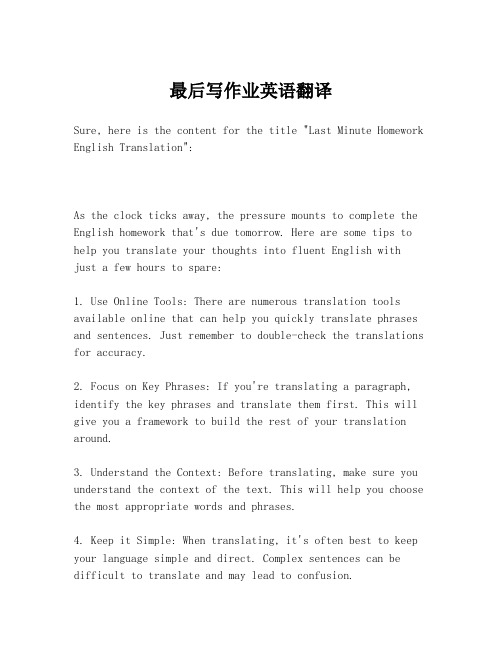
最后写作业英语翻译Sure, here is the content for the title "Last Minute Homework English Translation":As the clock ticks away, the pressure mounts to complete the English homework that's due tomorrow. Here are some tips to help you translate your thoughts into fluent English withjust a few hours to spare:1. Use Online Tools: There are numerous translation tools available online that can help you quickly translate phrases and sentences. Just remember to double-check the translations for accuracy.2. Focus on Key Phrases: If you're translating a paragraph, identify the key phrases and translate them first. This will give you a framework to build the rest of your translation around.3. Understand the Context: Before translating, make sure you understand the context of the text. This will help you choose the most appropriate words and phrases.4. Keep it Simple: When translating, it's often best to keep your language simple and direct. Complex sentences can be difficult to translate and may lead to confusion.5. Practice Makes Perfect: The more you practice translating, the better you'll get. Try translating short passages regularly to improve your skills.6. Ask for Help: If you're stuck on a particular phrase or sentence, don't hesitate to ask for help. Your teacher, classmates, or even online forums can be great resources.7. Proofread: After you've finished translating, take the time to proofread your work. Look for any grammatical errors or awkward phrasing that could be improved.8. Time Management: Plan your time wisely. Don't leave translation until the last minute. Start early and give yourself plenty of time to revise and polish your work.9. Learn from Mistakes: Each translation is a learning opportunity. If you make a mistake, take note of it and learn from it to avoid repeating it in the future.10. Stay Calm and Focused: Last-minute work can be stressful, but staying calm and focused will help you produce better work. Take a few deep breaths and approach the task with a clear mind.Remember, the goal of homework is not just to complete it but to learn and improve. So, even if you're working under atight deadline, try to make the most of the experience.Good luck with your last-minute homework translation!。
Unit 1How can we become good learners 基础巩固练习 学年人教
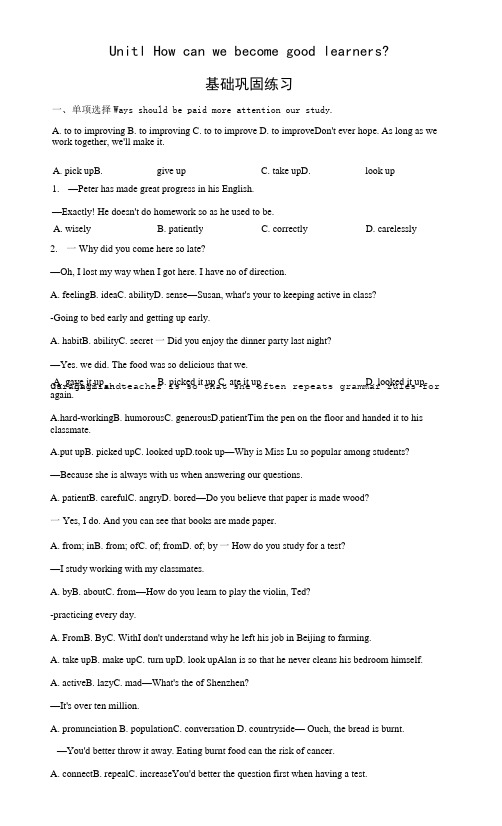
Unitl How can we become good learners?基础巩固练习一、单项选择Ways should be paid more attention our study.A. to to improvingB. to improvingC. to to improveD. to improveDon't ever hope. As long as we work together, we'll make it.A. pick upB. give upC. take upD. look up1. —Peter has made great progress in his English.—Exactly! He doesn't do homework so as he used to be.2. 一Why did you come here so late?—Oh, I lost my way when I got here. I have no of direction.A. feelingB. ideaC. abilityD. sense —Susan, what's your to keeping active in class? -Going to bed early and getting up early.A. habitB. abilityC. secret 一Did you enjoy the dinner party last night?—Yes. we did. The food was so delicious that we.Our English teacher is so that she often repeats grammar rules for us again and again.A.hard-workingB. humorousC. generousD.patientTim the pen on the floor and handed it to his classmate.A.put upB. picked upC. looked upD.took up —Why is Miss Lu so popular among students? —Because she is always with us when answering our questions.A. patientB. carefulC. angryD. bored —Do you believe that paper is made wood?一Yes, I do. And you can see that books are made paper.A. from; inB. from; ofC. of; fromD. of; by 一How do you study for a test?—I study working with my classmates.A. byB. aboutC. from —How do you learn to play the violin, Ted?-practicing every day.A. FromB. ByC. WithI don't understand why he left his job in Beijing to farming.A. take upB. make upC. turn upD. look upAlan is so that he never cleans his bedroom himself.A. activeB. lazyC. mad —What's the of Shenzhen?—It's over ten million.A. pronunciationB. populationC. conversationD. countryside — Ouch, the bread is burnt. —You'd better throw it away. Eating burnt food can the risk of cancer.A. connectB. repealC. increaseYou'd better the question first when having a test.A. wiselyB. patientlyC. correctlyD. carelesslyA. gave it upB. picked it upC. ate it upD. looked it upA. look atB. look afterC. look throughD. look up—Why not and see Mr Smith this evening?—It's a good idea.A. look upB. write downC. come roundD. warm upLinda's father hates waiting in long lines. I think he's jusl not very.A. popularB. talentedC. patientD. interestingThe of the motorbike is about 40 kilometers an hour. A. speedB. placeC. priceD. height二、完成句子3.请你更加关注你在考试中犯的错。
新世纪大学英语2册U1B2 (8)

Unit 8 Book 2Did You Have a Tough Childhood?1. Difficult Sentences1. (Para. 1) Intense difficulties, hardships and major obstacles areactuallyoften major contributors to success.1. Translate the sentence into Chinese.(=重大的困难、艰辛和障碍,往往能造就成功。
)2. Analyze the translation skill.(=The transformation of part of speech in English-Chinesetranslation is used here. We change the noun “contributors” inEnglish into the verb phrase “造就” in Chinese.)2. (Para. 1) It’s true that difficult childhoods do leave some people woundedand disadvantaged.Analyze the usage of “do”.(= Here the word “do” is used for emphasis.More examples:You do look nice in that hat.I do think she’s behaved badly.3. (Para. 3) … had watched their own parents struggle with intensepsychological dramas.Translate the sentence into Chinese.(=……目睹了自己的父母经历失和的一些戏剧性场面。
- 1、下载文档前请自行甄别文档内容的完整性,平台不提供额外的编辑、内容补充、找答案等附加服务。
- 2、"仅部分预览"的文档,不可在线预览部分如存在完整性等问题,可反馈申请退款(可完整预览的文档不适用该条件!)。
- 3、如文档侵犯您的权益,请联系客服反馈,我们会尽快为您处理(人工客服工作时间:9:00-18:30)。
1.Do you have a family? 你有孩子吗?
2.It's a good father that knows his son。
就算是最好的父亲,也未必了解自己的儿子。
3.I have no opinion of that sort of man。
我对这类人很反感。
4.He put 5 dollars into my hand,"you have been a great man today."他把5美圆塞到我手上说:“你今天表现得很好。
”
5.I was the youngest son, and the youngest but two。
我是最小的儿子,但我还有两个妹妹。
6.The picture flattered her。
她比较上照。
7.The country not agreeing with her, she returned to England。
她在那个国家水土不服,所以回到了英国。
8.He is a walking skeleton。
他很瘦。
9.The machine is in good repair。
机器已经修好了。
10.He allowed the father to be overruled by the judge, and declared his own s on guilty。
他让法官的职责战胜了父子的亲情,最终宣布儿子有罪。
11.You don't know what you are talking about。
你在胡说八道。
12.You don't begin to understand what they mean。
你根本不知道他们在干嘛。
(not begin to:毫不)
13.They didn't praise him slightly。
他们大大地表扬了他。
14.That's all I want to hear。
我已经听够了。
15.I wish I could bring you to see my point。
你要我怎么说你才能明白呢。
16.You really flatter me。
你让我受宠若惊。
17.He made a great difference。
有他没他结果完全不一样。
18.You cannot give him too much money。
你给他再多的钱也不算多。
19.The long exhausting trip proved too much。
这次旅行旷日持久,我们都累倒了。
20.You look darker after the holiday。
你看上去更健康了。
21.As luck would have it, he was caught by the teacher again。
不幸的是,他又一次被老师逮个正着。
22.She held the little boy by the right hand。
她抓着小男孩的右手。
(这里"by"与" with"动作主语完全相反)
23.Are you there?等于句型:Do you follow me?
24.If you think he is a good man, think again。
如果你认为他是好人,那你就大错特错了。
25.She has blue eyes。
她长着双蓝眼睛。
26.That took his breath away。
他大惊失色。
27.Two is company but three is none。
两人成伴,三人不欢。
28.The elevator girl reads between passengers。
开电梯的姑娘在没有乘客时看书。
"between"="without":相同用法:She modeled between roles。
译成:她不演戏时去客串下模特。
29.Students are still arriving。
学生还没有到齐。
30.I must not stay here and do nothing。
我不能什么都不做待在这儿。
31.They went away as wise as they came。
他们一无所获。
32.I won't do it to save my life。
我死也不会做。
33.Nonsense, I don't think his painting is any better than yours。
胡说,我认为他的画比你好不到哪去。
34.Traditionally, Italian presidents have been seen and not heard。
从传统上看,意大利总统有名无权。
35.Better late than the late。
晚了总比完了好/迟到总比丧命好。
36.You don't want to do that。
你不应该去做。
37.My grandfather is nearly 90 and in his second childhood。
我祖父快90岁了,什么事都需要别人来做。
38.Work once and work twice。
一次得手,再次不愁。
39.Rubber easily gives way to pressure。
橡胶很容易变形。
40.If my mother had known of it she'd have died a second time。
要是我妈妈知道了,她会从棺材里爬起来。
